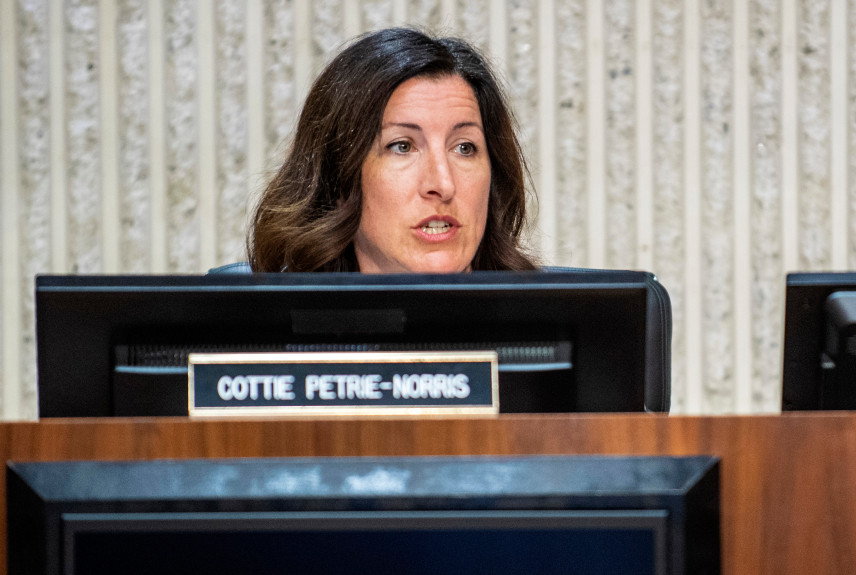Costa Mesa hearing: Lawmakers talk up plans, need for overhauling addiction treatment industry


COSTA MESA — How, exactly, can California’s broken addiction treatment system be fixed?
“As a former alcoholic and addict, I can tell you something,” Sal Landers, who once ran a sober living home and has 25 years of sobriety under her belt.
“When we’re drinking and using, we are the sneakiest, most manipulative and cunning people ever. You need surprise visits at all treatment facilities and sober living homes — and on those teams, at least one person in recovery. How could you understand what we’ve been through, the unique hell of alcoholism and addiction?”
It’s an expensive proposition, Landers told lawmakers at an Assembly committee hearing at Costa Mesa City Hall on Wednesday, Oct. 30. But, she added, if California really intends to root out fraudsters in the addiction recovery industry, there’s really no way around it.
Assemblymember Cottie Petrie-Norris, D-Laguna Beach, nodded. “The costs of enforcement may be substantial. But the cost of doing nothing is a lot higher.”
Scores of people filled the council chambers to explore the holes in California’s regulation of the addiction treatment industry and chart a path to better protect patients, and preserve the peace in neighborhoods around treatment facilities and sober living homes.
There was the personal. Assemblymember Sharon Quirk-Silva, D-Fullerton, told of her brother, who suffered from alcoholism and died last year. Costa Mesa Mayor Katrina Foley spoke of alcoholic relatives, and how her mother got sober with the help of Cottage Hospital in Santa Barbara while Foley was still a teen.
“There is a place and a need for good quality operators,” Foley said.
But nine out of 10 times — and perhaps 19 out of 20 times — that’s not what California offers, the experts said. As a result, people are dying.
“We are grateful for your leadership in cracking down on unethical practices, but more needs to be done,” said Jennifer Lohse, vice president and general counsel of the Hazelden Betty Ford Foundation, the nation’s largest non-profit treatment provider.
“I remain shocked at the lack of comprehensive regulation focused on patient care — not just for treatment providers, but for those involved in the entire continuum – sober home operators, recovery professionals and more,” she added, referencing California’s notoriously lax regulatory system.
The state, she said, needs to establish and enforce mandatory program standards that focus on quality. All treatment programs should be licensed, and all professionals working with patients should be credentialed. Right now, outpatient facilities – where the vast majority of treatment happens – do not need state licenses and get zero oversight. And virtually anyone can work in them, as California does not require addiction recovery workers to pass background checks or meet minimum education requirements.
“In no other of our home states is outpatient treatment regulation ‘optional,’” she said.
Representatives from the Orange County Sheriff’s Department and District Attorneys’ office said they need more and better tools to bring bad actors in line.
“Right now, when we get a complaint, we can issue a citation or a nuisance violation,” said Jeff Hallock, assistant sheriff with the Orange County Sheriff’s Department. “Without proper regulatory backbone for this industry, our efforts cannot be successful.”
California would do well to follow the lead of Florida, where patient brokering is a felony, false rehab advertising is a crime and a law enforcement task force is dedicated to cleaning up the recovery industry, several speakers said. California has not put that kind of muscle behind its efforts.
Southern California remains ground zero of the Rehab Riviera, with nearly 1,000 of California’s 1,800 licensed or certified addiction treatment facilities clustered in just four counties: Orange, Los Angeles, Riverside and San Bernardino.
The Orange County Register and Southern California News Group have chronicled reports of deaths, sexual assault, drug abuse and paying for rehab patients. Those reports have prompted federal probes, an Orange County task force, a sober living registry and new state laws designed to protect vulnerable people struggling with addiction. But speakers at the Costa Mesa hearing said that’s not enough.
Sen. Pat Bates, R-Laguna Niguel, has been working on the issue for years, pushing for criminal background checks and bans on false advertising. Lawmakers plan to offer a comprehensive overhaul of the rehab industry to the governor next year.
“We’re starting to build regulatory authority, attention and awareness,” Bates said. “2020 might be the year to really make a difference.”
 Pathways Drug Rehabilitation Luxury Addiction Treatment & Detox Center
Pathways Drug Rehabilitation Luxury Addiction Treatment & Detox Center


